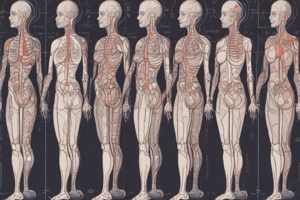Podcast
Questions and Answers
Which of the following glands is NOT part of the endocrine system?
Which of the following glands is NOT part of the endocrine system?
- Adrenal
- Thyroid
- Pancreas
- Liver (correct)
What is the primary role of sex hormones like testosterone and estrogen during adolescence?
What is the primary role of sex hormones like testosterone and estrogen during adolescence?
- Stimulate bone growth (correct)
- Control breathing
- Regulate blood sugar levels
- Promote skin health
Which gland secretes growth hormone?
Which gland secretes growth hormone?
- Pituitary (correct)
- Adrenal
- Parathyroid
- Thyroid
What is a key function of growth hormone (GH) in adolescents?
What is a key function of growth hormone (GH) in adolescents?
Which hormone is responsible for influencing secondary sexual characteristics like body hair and breast development?
Which hormone is responsible for influencing secondary sexual characteristics like body hair and breast development?
During adolescence, which physiological processes are regulated by hormones secreted by the endocrine system?
During adolescence, which physiological processes are regulated by hormones secreted by the endocrine system?
What is the role of IGF-1 in the body?
What is the role of IGF-1 in the body?
Which glands regulate hormone production during the transition from childhood to adulthood?
Which glands regulate hormone production during the transition from childhood to adulthood?
What hormones are secreted by the anterior pituitary under the influence of GnRH?
What hormones are secreted by the anterior pituitary under the influence of GnRH?
How does the endocrine system maintain hormone balance?
How does the endocrine system maintain hormone balance?
What can imbalances in the endocrine system during adolescence lead to?
What can imbalances in the endocrine system during adolescence lead to?
Why is the study of endocrine glands important for understanding human development?
Why is the study of endocrine glands important for understanding human development?
Flashcards are hidden until you start studying
Study Notes
Biology's Endocrine Glands and Adolescence: A Journey of Change
Endocrine glands, responsible for secreting hormones into the bloodstream, play a pivotal role in shaping our bodies and behaviors throughout our lives. One of the most significant periods of change, governed by the endocrine system, is adolescence—a time when the body undergoes rapid growth and development.
Endocrine Glands and Hormones
The endocrine system consists of several glands, including the hypothalamus, pituitary, thyroid, parathyroid, adrenal, pancreas, and the gonads (testes and ovaries). These glands secrete hormones, which are chemical messengers that regulate various physiological processes, such as growth, metabolism, and reproduction.
Hormones and Adolescence
During adolescence, the endocrine system orchestrates a symphony of changes driven by the release of sex hormones—testosterone and estrogen in males and females, respectively.
- Testosterone and Estrogen: These sex hormones stimulate growth spurts, affecting bone growth, muscle mass, and body composition. They also influence secondary sexual characteristics such as body hair, facial hair, and breast development.
- Growth Hormone (GH): The pituitary gland secretes growth hormone, which stimulates growth and development. GH also helps in increasing muscle mass and bone density, as well as promoting metabolism and glucose utilization.
- Insulin-like Growth Factor 1 (IGF-1): Produced by the liver, IGF-1 amplifies the effects of growth hormone. It is vital for growth, cell reproduction, and cell maintenance.
Transition Mechanisms
As adolescents transition from childhood to adulthood, their bodies experience a surge in hormone production. This increase is regulated by the hypothalamus and pituitary glands, which receive input from the brain's neural circuits.
- Brain Regulation: The hypothalamus secretes GnRH (Gonadotropin-releasing hormone), which stimulates the anterior pituitary to secrete LH (Luteinizing Hormone) and FSH (Follicle-stimulating Hormone). LH and FSH, in turn, stimulate the gonads to produce sex hormones.
- Feedback Loops: The endocrine system operates using feedback loops between hormones and their target tissues. As hormone levels rise, they trigger changes in the body, and in response, these changes feed back to the endocrine glands, telling them to adjust hormone production accordingly.
The Discussion
Endocrine changes during adolescence can affect physical appearance, behavior, and social interactions. However, the endocrine system is constantly balancing hormone levels to ensure overall health. Imbalances can lead to a range of health problems, such as early or delayed puberty, obesity, and diabetes.
As scientists continue to study the endocrine system, we gain a better understanding of how hormones influence development and well-being. By learning about the endocrine glands and their roles, we can foster a deeper appreciation for the complexity of human growth and maturity during adolescence.
Studying That Suits You
Use AI to generate personalized quizzes and flashcards to suit your learning preferences.




